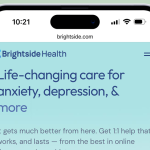Table of Contents
- We’ve spent over 10,000 hours researching online therapy platforms and went behind the paywall to personally test the most popular options. We use these firsthand insights to bring you our top picks for the best online cognitive behavioral therapy.
- We conducted focus groups with online therapy users and providers to determine what criteria each group values in a platform.
- Our team personally tested each platform for at least four weeks, focusing on the sign-up process, therapist selection, therapy session quality, and any additional CBT resources.
- We consulted over 60 mental health experts to determine what to look for in an online therapy platform.
- We scored each platform on four indexes: affordability, data privacy, availability, and inclusivity.
- Learn more about how we tested online CBT platforms below.
Key takeaways
- Online-Therapy.com is our pick for the best online cognitive behavioral therapy because its model is exclusively designed around CBT principles.
- Research supports the use of CBT to treat certain mental health conditions, like anxiety and depression.
- Through surveys, focus groups, testing, and expert recommendations, we developed criteria to consider when selecting the best online therapy platforms for CBT.
Cognitive behavioral therapy (CBT) is a form of talk therapy that can help patients become aware of and change negative patterns in their thoughts and behaviors. It has been shown in research studies to be effective for mental health conditions such as anxiety, depression, and alcohol and drug use problems. CBT relies on collaboration with your therapist, and it can work in both an in-person or online setting.
“The core principles and techniques of CBT—such as identifying and challenging negative thought patterns, developing coping strategies, and practicing new behaviors—translate well to an online format,” says Sandra Kushnir, a licensed marriage and family therapist and founder and CEO of Meridian Counseling.
Recent research indicates that online CBT could be just as effective for depression as in-person CBT. A 2017 review also found that online CBT could be effective for managing conditions like generalized anxiety disorder, obsessive-compulsive disorder (OCD), panic disorder, social anxiety, and more.
Several online platforms can connect you with a therapist who practices CBT, and many make our list of the best online therapy platforms. To help you find the right service for your needs, we’ve compiled a list of the best online cognitive behavioral therapy platforms of 2024. Find them below, along with expert insights to guide your decision.
The best cognitive behavioral therapy services of 2024
- Online-Therapy.com: Best online CBT overall
- BetterHelp: Best online CBT with financial aid
- Brightside: Best online CBT that takes insurance
- Thriveworks: Best for choosing your own CBT provider
- Grow Therapy: Best pay-per-session online CBT
Data privacy on mental health platforms
In addition to understanding how your data is collected and used before signing up for a platform, we recommend the following basic steps that we learned from the U.S. Department of Health and Human Services (HSS) and Mozilla Foundation’s *Privacy Not Included project:
- Attend your online therapy appointment in a private location, preferably not on a public Wi-Fi network.
- Use your personal computer when possible.
- Look out for checkboxes during sign-up to opt out of data tracking or medical information disclosure.
- Sign up with your email, not with a social login like Facebook.
- Choose a strong password to create a secure account login.
- Add a bullet point on reviewing the platforms’ privacy guidelines when choosing a provider to understand whether they share private information.
Online-Therapy.com: Best online CBT overall
Why Online-Therapy.com is our pick for the best overall online CBT
Online-Therapy.com earned our top spot because of its emphasis on CBT. Not only do all therapists on the platform practice CBT, but subscriptions include access to a comprehensive CBT program.
Online-Therapy.com’s program is divided into eight sections, which include educational content about CBT principles available in text, audio, and video format. It also includes worksheet assignments. Your therapist can see all your worksheet responses and should offer feedback within 24 hours, Monday through Friday. You can complete the program at your own pace or skip sections that don’t apply to your situation.
In addition to these CBT resources, you can message your therapist anytime between sessions. Ask your provider how quickly you can expect to hear back from them.
Who may like Online-Therapy.com: People who want a comprehensive CBT platform with access to additional CBT resources to help them continue learning between sessions.
Who may want to avoid Online-Therapy.com: Those seeking an online therapy platform that accepts insurance.
Online-Therapy.com tester and user insights
Overall, our survey respondents reported a high rate of satisfaction with Online-Therapy.com.
Ninety percent of respondents in our February 2024 survey of Online-Therapy.com users agree that their therapist treats them with respect, and over 94 percent of respondents who interacted with customer service report that their issues were resolved quickly.
That said, one tester reports that they experienced limited appointment availability when they signed up. They couldn’t find a therapist who treated their particular mental health concern with appointments outside their regular working hours (6 a.m. to 4 p.m. PDT). Additionally, while they are impressed with the selection of worksheets and resources, the platform’s therapists don’t always use them in their treatment approach, so users may need to switch therapists if they would prefer to follow the program closely and their therapist isn’t taking that approach.
Read our in-depth Online-Therapy.com review for more information.
From one of our Online-Therapy.com testers
“The therapist was prompt, the sessions were good, and the platform has a ton of worksheets and tools, but the therapist never assigned them or suggested I make use of them… It’s a shame that the platform functionality is fairly expansive, but my therapist didn’t seem to interact with it.”
BetterHelp: Best online CBT with financial aid
Why BetterHelp is our pick for the best online CBT with financial aid
According to an October 2023 survey of 600 online therapy users, 67 percent of participants had to stop treatment because of the cost—either the online therapy service was too expensive out of pocket or not covered by their insurance.
If you can’t rely on your insurance to pay for online CBT, a platform like BetterHelp may make therapy more accessible. BetterHelp doesn’t accept insurance. However, its monthly subscription costs between $280–$400 per month, and it offers financial aid that’s very easy to apply for when signing up. The platform’s financial aid can provide you with a discount of up to 40 percent off your subscription per month if you are approved, making this an affordable online therapy option.
When signing up for BetterHelp, you’ll fill out a questionnaire detailing your mental health concerns, overall goals, and preferences for your therapist, like their gender. You will also have the option to fill out the application for financial aid. Our testers filled out the application for financial aid when signing up and were approved quickly. Many therapists practicing with BetterHelp offer online CBT, but if your initial match isn’t a good fit, you can switch to a different one at any time.
Who may like BetterHelp: People who want to pay for online therapy out of pocket. People who want access to group sessions.
Who may want to avoid Online-Therapy.com: People who want to pay for online therapy with insurance. People who want to choose their therapist as opposed to being matched.
BetterHelp tester and user insights
In addition to BetterHelp’s weekly sessions, our testers appreciate BetterHelp’s additional online group therapy sessions, which are hosted weekly on various topics and last for 90 minutes.
Testers feel like this is an impressive feature to include with the subscription at no additional cost. Testers note that they enjoy the variety of these group sessions and can learn new coping mechanisms in a completely different environment than standard one-on-one therapy.
Read our in-depth BetterHelp review for more information.
From one of our BetterHelp testers
“They have journaling and classes as a benefit of being a subscribed member to BetterHelp… it is a nice benefit to have access to all of those extra resources for free on top of the subscription.”
Brightside: Best online CBT with insurance
Why Brightside: is our pick for the best online CBT with insurance
The majority of respondents from our October 2023 online therapy survey reported using insurance to pay for online therapy. If you’re looking for online therapy that takes insurance to pay for your sessions, then Brightside could be a good option to consider.
They accept insurance plans from major companies like Aetna, Blue Cross Blue Shield, United HealthCare, Ambetter, Cigna, and more. You can view which insurance companies are accepted in each state before signing up, but Brightside won’t display the specific plans.
In addition to weekly video sessions with your therapist, Brightside provides access to a guided mental health course that emphasizes CBT principles, like identifying your behavior and thought patterns.
Each lesson features a series of educational videos and interactive exercises, and your therapist can offer guidance and feedback on your responses. However, the lessons are released in intervals. For example, if you only pay for one month of treatment with your provider, you only receive access to the first four lessons.
Brightside is also unique because it offers a therapy plus psychiatry plan for those interested in both CBT and medication therapy. You will meet with both your online psychiatrist and therapist through the Brightside app, and both will be able to see the notes from your previous sessions to stay up to date on your progress.
Who may like Brightside: People who want to pay for online CBT with insurance. Those who want access to additional resources and a structured program.
Who may want to avoid Brightside: People who want to pay per session for therapy, and those looking for therapy for children and teens.
Brightside: tester and user insights
Our testers generally enjoy Brightside’s resources in the Self Care plan. They find the language in the videos validating and encouraging, and the exercises take around five minutes to complete. They think that these exercises help build on what they discussed in the video therapy appointments.
Unfortunately, one tester encountered glitches while using the mobile app, like videos freezing. Additionally, that same tester had some difficulty scheduling appointments with their therapist. The days their therapist was supposed to be available were incorrectly blocked off on the schedule, so they had to reach out to find a session time.
Check out our full Brightside review for more information.
From one of our Brightside testers
“I liked the Brightside therapy exercises. Lots of topics come up during a video session, but the offline therapy lessons offer another way to connect with your provider and receive guidance.”
Thriveworks: Best for choosing your own CBT provider
Why Thriveworks is our pick for choosing your own CBT provider
If you’d like to choose your own therapist for CBT instead of being matched with one by a platform, Thriveworks could be a good option. Thriveworks isn’t a subscription service. Instead, you’ll choose your therapist from the directory and book sessions with them directly.
You can view available therapists in your state before booking a session. You can also filter therapists by gender, spoken languages, and treatment approach, including CBT. Therapist availability will vary by state, so your experience with Thriveworks may depend on where you live. Therapy sessions last 50–60 minutes on Thriveworks, which is longer than many of the other platforms we’ve reviewed.
Thriveworks also accepts more than 500 insurance plans, which can make it a more affordable choice if they accept your coverage.
Who may like Thriveworks: People who want the option to search for and choose their own provider. People who want to pay per-session.
Who may want to avoid Thriveworks: Online therapy users looking for a platform with a subscription and extra resources.
Thriveworks tester and user insights
Our testers find the website easy to navigate and appreciate that you can view the therapist directory before signing up. They like that you can see every therapist’s specialties, treatment methods, and schedule.
While each tester’s therapist provided them with tools to track their progress, they note that these extras were not built into the platform itself. Thriveworks does not offer a mobile app, so you will need to log in through the website to manage your account and attend therapy sessions.
See our Thriveworks review for more detailed information.
From one of our Thriveworks testers
“My therapist asked me several questions to get to know me and get a baseline for where I was at and sent me resources to review afterward about the type of therapy she would offer.”
Grow Therapy: Best pay-per-session online CBT
Why Grow Therapy is our pick for the best pay-per-session CBT
Not everyone has the time to meet up with their therapist every week, which could make a monthly subscription less financially feasible. So, if you don’t like committing to a monthly subscription for online CBT, a platform like Grow Therapy could provide a solution.
Grow Therapy allows you to book sessions with your therapist individually. You’ll start by selecting your state, insurance info, and mental health concern. Grow Therapy will show you a list of practitioners who match your criteria. You can narrow your options further with filters like a therapist’s gender, spoken languages, and availability.
While many providers on Grow Therapy practice CBT, you’ll have to click on their full profile to see a therapist’s treatment approach. From there, you can choose available time slots on the therapist’s profile to book a session.
Who may like Grow Therapy: People who want to choose their therapist and book per session rather than a monthly subscription.
Who may want to avoid Grow Therapy: People who want more resources directly through a platform or a subscription plan.
Grow Therapy tester and user insights
Our testers like that they didn’t need to sign up for an account to browse the therapist directory and could choose their therapist instead of being matched. Though they couldn’t sort by therapists who practice CBT, by reading the therapists’ bios they easily found ones who practice CBT and have availability in their schedules.
Though Grow Therapy doesn’t directly offer supplementary CBT resources through their site, every tester’s therapist provided educational resources and worksheets from external sites to supplement their virtual sessions.
See our full Grow Therapy review for more details.
From one of our Grow Therapy testers
“[My therapist] sent me information on decatastrophizing and cognitive disorders, and they had worksheets attached. Having extra readings and materials like this is super helpful.”
How we test and choose the best online CBT platforms
The Handbook Team researched more than 70 online therapy and psychiatry platforms, directories, and networks. Based on our research, we signed up for the top 26 platforms to test for ourselves and find the best options for online CBT.






First-hand testing experience
Testers explored the platforms and attended online therapy sessions for at least four weeks. Our testers are instructed to test the platforms through the lens of a real user, paying attention to how easy or difficult it is to find a therapist they could talk to. Additionally, testers are located throughout the United States, allowing us to gauge the availability of providers in different locations. Testers log their experience in a diary and come together to share their findings when testing concludes.
Online therapy surveys
We received survey responses from over 2,000 online therapy and psychiatry users in varying age groups. These surveys asked current users of 10 of the most popular online therapy platforms to evaluate each service. Their feedback taught us firsthand how users leverage each platform’s unique features and helped us learn how users feel about important issues such as data privacy.
Focus groups
We host focus groups of practicing online therapists and current online therapy and psychiatry users to understand what each group values on their side of the screen. We ask therapists about teletherapy’s pros and cons and learn what factors influence online therapy and psychiatry users to choose one platform over another.
Our online therapy rating indexes
We created a unique rating index to see how varying platforms measure up to four key factors:
- Affordability: We look for platforms with affordable out-of-pocket prices. We also include counseling services that accept insurance or offer financial aid.
- Data privacy: We examine how each platform collects and handles user data. If a brand doesn’t have this information available on its website, we reach out to learn from it directly.
- Therapist availability: We collect data on a brand’s total number of in-network therapists and their appointment availability in different states.
- Inclusivity: We evaluate platforms on their inclusivity and diversity of practitioners. We also note if a platform allows you to filter therapists by ethnicity or gender identity.
Consulting mental health experts
We consult with over 60 experts to understand the pros and cons of online therapy platforms and ensure that our article contains up-to-date information. We also interviewed three additional mental health experts for this article to gain more insight into online CBT.
Learn more about our online therapy testing and review methodology.
Our online cognitive behavioral therapy testing process
In a mental health emergency
Online therapists may not be the most appropriate resource to help in a mental health crisis. If you or someone you know is a danger to themselves or others around them, it is an emergency, and it cannot wait for an online therapist’s response. Don’t wait. You can find help immediately by:
- Calling 911.
- Visiting your local urgent care or emergency room.
- Calling or texting 988 for the Suicide & Crisis Lifeline.
- Chatting online at 988lifeline.org.
- Calling the Substance Abuse and Mental Health Services Administration (SAMHSA)’s Helpline at 1-800-662-4357 or texting your zip code to 435748.
All the above options will connect you with trained professionals who can provide crisis support. You can find even more resources, including international options, on our helpline directory page.
What is cognitive behavioral therapy (CBT)?
“CBT is a talk therapy with lots of psychoeducation [and] time spent processing through thoughts, emotions, and behaviors [with] homework for clients to do outside of the session,” says Kelsey Thompson, LMFT, a therapist practicing at Light Within Counseling.
CBT works by helping you identify unhelpful thinking patterns or behaviors and working to change them through new behavioral tools and techniques. Your therapist may teach you new problem-solving skills, how to face your fears, or how to calm your mind and body.
Providers may help you reach your goals through interactive exercises, like role-playing, or “homework” assignments, like worksheets, that you complete between sessions.
Research indicates that CBT can be effective for conditions like anxiety, attention deficit hyperactivity disorder (ADHD), depression, eating disorders, and chronic fatigue syndrome.
To learn more, read our article on Cognitive Behavioral Therapy (CBT).
What to consider when choosing the best online CBT for you
Based on our research and interviews with licensed mental health experts, you may want to consider the following criteria when choosing the best online CBT platform for your needs.
- Therapist qualifications: “Ensure the therapist is licensed and has experience in treating the specific issues you are facing,” says Sandra Kushnir, LMFT.
- Resources: Look for platforms that offer supplementary resources to support your CBT journey, like a journal, worksheets, or educational resources.
- Therapist selection: If you prefer to work with a therapist of a certain gender, ethnicity, or cultural background, assess the diversity of the platform’s therapist selection.
- Price: “Consider the cost of services and whether they are covered by your insurance or offer financial assistance options,” says Shmaya Krinsky, psychologist at Anxiety and Behavioral Health Psychotherapy.
- Type of sessions: Check if the platform offers various modes of communication, such as video, phone, or text therapy, Krinsky recommends. Consider how you’d feel the most comfortable meeting and talking with your therapist.
- Security and privacy: “Look for platforms that offer secure, encrypted communications to protect your privacy,” suggests Kushnir.
Our final verdict
Our pick for the best overall online CBT is Online-Therapy.com since the platform is specifically designed around CBT principles and includes guided lessons and worksheets through the platform. The best online CBT provider for you will depend on your preferences, like a subscription vs. per session model, and whether you want to pay using insurance.
Compare the best online cognitive behavioral therapy platforms of 2024
| Cost | $200–$440 per month | $280–$400 per month | $299–$349 per month | Varies by State | Varies by provider and insurance |
| Session types | Video, audio, live chat | Video, audio, live chat | Video | Video, audio | Varies by therapist |
| Accepts insurance? | No | No | Yes | Yes | Yes |
| Additional CBT resources | Educational lessons, worksheets, journal | Journal, group webinars, blog | Structured Self Care program, exercises | Blog, ebooks | Blog |
Frequently asked questions
Yes. Research indicates that online CBT can be an effective treatment option for conditions like depression, OCD, anxiety, and more. “The key is finding a qualified therapist and ensuring that both the therapist and client are comfortable with the digital medium,” explains Kushnir.
The choice of whether to opt for online or in-person therapy depends on your needs and preferences. “The effectiveness and duration of CBT do not significantly differ between online and in-person formats,” says Krinsky.
“Generally, CBT is considered a short- to medium-term therapy, typically ranging from eight to 20 sessions,” says Kushnir. She adds that the number of sessions you need can depend on factors such as the severity of your concern, your level of engagement, and your relationship with your therapist.
- (2017). What is cognitive behavioral therapy? American Psychology Association. Link
- Alavi, N., Moghimi, E., Stephenson, C., Gutierrez, G., Jagayat, J., Kumar, A., Shao, Y., Miller, S., Yee, C.S., Stefatos, A., Gholamzadehmir, M., Abbaspour, Z., Shirazi, A., Gizzarelli, T., Khan, F., Patel, C., Patel, A., Yang, M., & Omrani, M. (2023) Comparison of online and in-person cognitive behavioral therapy in individuals diagnosed with major depressive disorder: a non-randomized controlled trial. Frontiers in Psychology, 14. Link
- Kumar, V., Sattar, Y., Bseiso, A., Khan, S., & Rutkofsky, I.H. (2017). The Effectiveness of Internet-Based Cognitive Behavioral Therapy in Treatment of Psychiatric Disorders. Cureus, 9(8). Link
- Thase, M.E., McCrone, P., Barrett, M.S., Eells, T.D., Wisniewski, S.R., Balasubramani, G.K., Brown, G.K., & Wright, J.H. (2020). Improving Cost-effectiveness and Access to Cognitive Behavior Therapy for Depression: Providing Remote-Ready, Computer-Assisted Psychotherapy in Times of Crisis and Beyond. Psychotherapy and Psychosomatics, 89(5), 307–313. Link
- February 2024. Pollfish. Online-Therapy.com survey. 100 respondents.
- October 2023. Pollfish. Online therapy survey. 600 respondents.
- (2023, July 14.) FTC Gives Final Approval to Order Banning BetterHelp from Sharing Sensitive Health Data for Advertising, Requiring It to Pay $7.8 Million. Federal Trade Commission. Link
- Vasile, C. (2020). CBT and medication in depression (Review). Experimental and Therapeutic Medicine, 20(4), 3513–3516. Link
- Nakao, M., Shirotsuki, K., & Sugaya, N. (2021). Cognitive–behavioral therapy for management of mental health and stress-related disorders: Recent advances in techniques and technologies. BioPsychoSocial Medicine, 15(16). Link



















